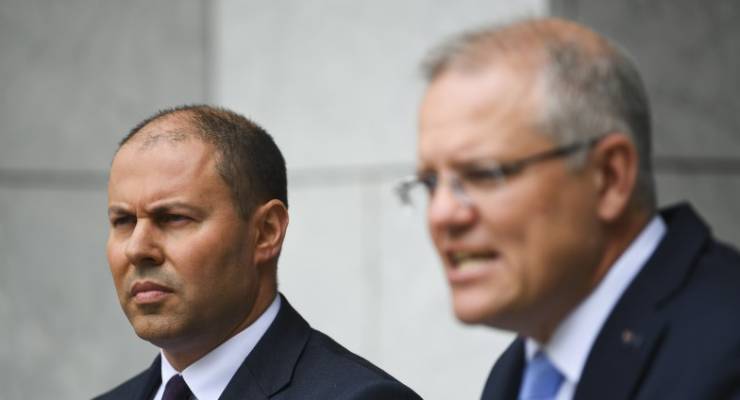
After a meeting between Prime Minister Scott Morrison, Treasurer Josh Frydenberg, Reserve Bank governor Philip Lowe and deputy governor Guy Debelle it has become clear the federal government will enact some kind of fiscal stimulus to stem the fallout of the COVID-19 pandemic.
Frydenberg said it would have to “have a B in front of it”, suggesting that the stimulus would be in the billions of dollars. Many economists think it might be around $4 billion initially.
It is good to see the government realise that in times of economic crisis a responsible government should not fetishise a balanced budget, and instead fill some of the lost demand and support affected businesses.
That said, it’s worth pausing to consider just what the stimulus might involve and how effective it will be in different sectors.
First take the university sector. University of Sydney vice chancellor Michael Spence has said that with 15,000 of its international students stuck in China the likely financial hit in the first half of this year will be $200 million. That will severely weaken the university’s balance sheet and lead them to cut back on building projects, casual staff, and pretty much any other discretionary spending.
That has flow-on effects to the rest of the economy: in construction, retail, the hospitality sector, and so on.
And, of course, the University of Sydney is just one of 40 universities in Australia. One estimate puts the losses across the sector at north of $2 billion, at a minimum.
Italy has just ordered all universities to close. Were that to happen in Australia for a significant period of time the financial toll to our universities could be crippling.
Direct stimulus to universities could help keep them from ramping down operations in a temporary but costly way, only to have them ramp back up once the crisis passes. Smoothing out the financial shock to the university sector makes sense, and only the federal government can do it.
In the tourism industry things may appear similar but are a little more complicated. There are some large players like airlines that are taking a big hit.
But it’s harder to clearly identify every hotel or tour operator being affected by reduced tourism. Restaurants are being affected, but is there going to be support for every restaurant across the country? If so, a billion dollars or so might not go very far.
Pressing that logic further, what about all the businesses caught up in the flow-on effects from the sectors that are more directly hit? Helping those businesses would not involve “targeted” stimulus, as the prime minister has emphasised, but much broader support.
Indeed, the Council of Small Business Organisations Australia has called for such support, saying, “In cases where businesses are forced to stand down employees from a workplace, the 13-week eligibility period for the employment benefits of affected employees should be waived and businesses should be given financial assistance to maintain the wages of impacted staff at the minimum award wage.”
That might be the right thing to do, to avoid layoffs that are costly and distressing to the workers affects, but also for the businesses themselves and the economy more broadly through reductions in spending.
Mr Morrison has been eager to point out that he is not going to cut cheques to households a la Rudd-Henry in 2008. But he may well be going down an analogous path on the supply side of the economy.
Keeping people in jobs is vitally important and broad-based wage support would definitely help do that.
It’s worth remembering that at some level the Australian federal government is basically a giant insurance company. It collects tax revenue (think of that as “premiums”) and it provides insurance in healthcare, the aged pension, and the NDIS. On the side it runs education and prison businesses.
The government’s COVID-19 stimulus may turn out to look much like business interruption insurance. That would be helpful.
But if the crisis escalates — and it looks disturbingly likely that it will — then the traditional role of stimulus in boosting aggregate demand and reversing a vicious cycle of negative beliefs about the economy will come squarely back into focus.
Mr Morrison may have to cut $1000 cheques to households after all.
Richard Holden is professor of economics at UNSW Business School.








Instead of sending a $1000 cheque ((which could be banked and saved, and not provide a ‘stimulus’), why not send everyone a debit card, preloaded with $1000 and with a 12 month expiry date, which can only be used in restaurants, cafes, hotel or motel accommodation, domestic airlines, and whatever sector it’s considered necessary to support? And if it’s not used in the 12 months, it’s lost.
Hey, that could work……& the Coalition might even do it if they can get their Indue mates involved at $10,000 per card ;).
They won’t give out money – it’s not in their DNA. Look at Newstart, look at robodebt, look at bushfire relief delays. Rather than spend money, they will cut their own revenue -tax offsets, depreciation, that sort of thing. Which of course will do nothing to stimulate business or the economy, as we have witnessed since last year’s single piece of post-election legislation.
Useful article, but I think an awful lot could go wrong with the small business proposal that would see a lot of money go out of the public purse and into the profits of small businesses, with stood down workers seeing little but a few weeks “extra” unemployment benefit.
Also, while I get that from the point of view of economic analysis it might sometimes be useful to think about government as a business, in general it overlooks the key difference between purchasing a service (as an individual) and contributing to securing a public good (as a citizen).
Mmm. Remember that getting rid of penalty rates was going to lead to increased number of jobs. They admit that not a single new job was created by this measure. And now they want government support to keep workers employed – while no doubt participating in the odd bit of wage theft. Stuff them – they can’t be trusted. I feel sorry for people who lost their businesses in the fires, but shouldn’t they be lobbying the powers that be to distribute some of the millions of bushfire relief dollars to assist. Not a general handout to a whole industry.
Well said, Mary. I notice there is no mention of raising Newstart or pensions in this article…when just about every economist in the country is saying that is what should happen.
At least the poor would SPEND any extra money, and contribute to stimulating the economy. But no…this useless government only wants to give money to their mates…e.g. business owners!
Go figure!!
‘Frydenberg said it would have to “have a B in front of it”.’ Could be buggar-all.
After his previous apologia for Trump and faint praise for Biden this lame by-the-numbers effort shows how threadbare economics is.
Also a good indication of the dearth of nous at Crikey to publish such tripe.